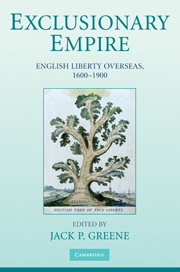Book contents
- Frontmatter
- Contents
- Notes on Contributors
- Preface
- Introduction
- 1 The Languages of Liberty in British North America, 1607–1776
- 2 Liberty and Slavery
- 3 “Era of Liberty”
- 4 Liberty and Modernity
- 5 Federalism, Democracy, and Liberty in the New American Nation
- 6 Liberty, Order, and Pluralism
- 7 Contested Despotism
- 8 “… a bastard offspring of tyranny under the guise of liberty”
- 9 How Much Did Institutions Matter?
- 10 The Expansion of British Liberties
- Index
8 - “… a bastard offspring of tyranny under the guise of liberty”
Liberty and Representative Government in Australia, 1788–1901
Published online by Cambridge University Press: 05 June 2012
- Frontmatter
- Contents
- Notes on Contributors
- Preface
- Introduction
- 1 The Languages of Liberty in British North America, 1607–1776
- 2 Liberty and Slavery
- 3 “Era of Liberty”
- 4 Liberty and Modernity
- 5 Federalism, Democracy, and Liberty in the New American Nation
- 6 Liberty, Order, and Pluralism
- 7 Contested Despotism
- 8 “… a bastard offspring of tyranny under the guise of liberty”
- 9 How Much Did Institutions Matter?
- 10 The Expansion of British Liberties
- Index
Summary
INTRODUCTION
The establishment of elected governments at the colony and national levels in Australia involved a drawn out process that extended over a century. Throughout the first half of the nineteenth century the Colonial Office resisted the colonial campaigns for responsible government, but from the 1840s it became increasingly compliant to the demands emanating from New South Wales, in particular, for the institution of a bicameral parliament. In the end, British flexibility ensured that representative government at the colonial level as well as the succeeding federal Constitution resulted from peaceful political and constitutional movements rather than from revolution. Australians believed that the adoption of the Constitution meant Australia had ceased to be a set of subservient colonies and become a nation in partnership with Great Britain. Rather than promoting a spirit of independence, federation strengthened the commitment to nationhood within the empire.
Developments in colonial Australia to some extent mirrored those in South Africa and New Zealand. In the course of the nineteenth century colonial elites emerged in all three colonies, leading to campaigns for freedom of the press and responsible government. However, as was the case in India, imperial authorities referred to particular local circumstances, in this case that New South Wales and Van Diemen's Land (Tasmania) were convict colonies, to justify Britain's continued support of the governors' executive and legislative authority and its refusal to establish representative institutions.
- Type
- Chapter
- Information
- Exclusionary EmpireEnglish Liberty Overseas, 1600–1900, pp. 220 - 247Publisher: Cambridge University PressPrint publication year: 2009

